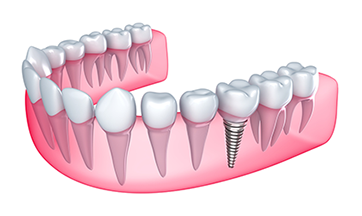 Tooth problems during Christmas are worse than the Grinch stealing your presents. Listed below are several dental emergencies and their solutions should you find yourself in a dental pinch while we are closed over the holidays.
Tooth problems during Christmas are worse than the Grinch stealing your presents. Listed below are several dental emergencies and their solutions should you find yourself in a dental pinch while we are closed over the holidays.
- Broken or Chipped Tooth: Use temporary dental restorative material or orthodontic wax to cover the area. These may be found in the dental section of local drug stores.
- Loose Crown: Use temporary dental cement to re-seat the crown until you can be seen in our office. Be sure to perform a dry run to make sure you can seat it properly. This material is also found at the drug store.
- Swelling: If the swelling is severe, or extends into the eye or neck, visit Urgent Care or the Emergency Room immediately. You may need an antibiotic to control infection.
- Toothache: For mild discomfort use two 200 mg Ibuprofen (Advil or Motrin) and two 500 mg Acetaminophen (Tylenol) in combination every 4-6 hours. Studies show this protocol is as effective as prescription pain medicines.
- Loose Orthodontic Bracket: A loose or lost bracket will not pose a problem over the short term. If a wire is loose, clip it with wire pliers and place orthodontic wax if needed to cover it.
Hear from Some of Our Patients
Do you wake up every morning tired instead of refreshed? You may have sleep apnea, a condition affects more than 18 million people, according to the National Sleep Foundation. Our Waynesville, NC, dentist, Dr. Michael Gillespie, shares a few signs of sleep apnea and explains what you can do to treat the condition.
What is sleep apnea?

Sleep apnea occurs when you stop breathing while you sleep. The breathing pauses are usually short, lasting no more than a few seconds to a minute. These pauses occur hundreds of times throughout the night and deprive your brain and body of oxygen. Untreated sleep apnea has been linked with serious conditions such as heart attacks, strokes, high blood pressure, heart failure, depression, diabetes or an irregular heartbeat.
How can I tell if I have sleep apnea?
Sleep apnea causes multiple symptoms, some of which may not seem to be initially related to breathing pauses. Typical sleep apnea symptoms include:
- Loud Snoring: Do your family or roommates complain about your snoring or have you woken yourself up due to the loud noises you produce at night? Snoring is a common symptom of sleep apnea, although it’s possible to snore without having the condition.
- Gasping or Jerking: People who have sleep apnea often gasp for breath or jerk awake during the night. These actions are your body’s attempt to restart your breathing.
- Morning Headache: Oxygen deprivation can cause a headache that usually goes away about an hour after you wake up.
- Mouth and Throat Symptoms: A sore throat and dry mouth may be an indication that you have sleep apnea, particularly if these symptoms improve as the day goes on.
- Fatigue: Do you feel tired all the time, have difficulty concentrating or feel irritable? All of these symptoms can occur if you’re not getting enough sleep at night due to breathing pauses.
How is sleep apnea treated?
A continuous positive airway pressure (CPAP) machine is the standard treatment for sleep apnea. The machine sends a constant stream of air into your throat, which keeps your airway open. Although CPAP machines are certainly effective, not everyone can tolerate them. We offer a more comfortable, low-tech option in our Waynesville office that is very helpful in treating sleep apnea symptoms. The custom-made oral appliance moves your lower jaw forward and repositions your tongue, ensuring that your airway remains open while you sleep.
Are you looking for an alternative to CPAP machines? Find out if an oral appliance is a good option for you by calling (828) 456-9007 to schedule an appointment with Waynesville, NC, dentist, Dr. Gillespie.
Hear from Some of Our Patients

Is your smile more TRICK than TREAT? We have several options to close gaps, improve alignment, and create a smile that will release your inner glow!
Using a series of clear aligners, we can move your teeth into proper position almost invisibly! Depending on the amount of movement, treatment is generally between 3-12 months. Click HERE for information on ClearCorrect.
This appliance is for front teeth only. Using light forces, teeth can typically be aligned within 6-12 months. Click HERE for information on the Inman Aligner.
We have provided traditional orthodontics for mild to moderate cases for over 15 years. Treatment with traditional brackets and archwires is typically 12-24 months. However, many adult “relapse” cases may be treated within 3-6 months. Click HERE for information on traditional orthodontics.
Let us know if you would like more information on our orthodontic services!
Hear from Some of Our Patients
Hear from Some of Our Patients
Patients who have missing teeth or major tooth and gum problems often have questions about dental implants. Implants are the modern solution for replacing teeth and are now often preferred over other solutions like dentures and bridges. Here are a few of the most common frequently asked questions about dental implants, answered. Having more knowledge of this dental treatment may inspire you to take action and call your Waynesville, NC dentist to see if you’re a candidate for this procedure.Dental Implants

How Do Dental Implants Work?
Dental implants are designed to serve the same purpose as the root of a tooth. They are small titanium devices that resemble screws that are inserted into the bone tissue below the gumline. When the implant heals into the bone, which may take several months, an abutment and permanent crown are placed on the top. With a porcelain or ceramic crown, the implanted tooth is indistinguishable from your other teeth.
Why Are Dental Implants the Best Solution?
The main reason why dental implants are the ideal solution is that they are permanent. Once they’re installed, they’re no different than any of your other teeth in terms of function and appearance. They also help keep the bone tissue healthy and strong. When you get dentures or bridges, the bone tissue can degrade over time.
Who Can Get Dental Implants?
Only patients who have generally good dental health can get dental implants. Viable bone tissue is needed to ensure that the implants will stay rooted. That’s why it’s important to see a dentist for a tooth implant as early as possible. In some cases, a bone grafting procedure can help improve a patient’s chances of having a dental implant integrate successfully.
How Long Will Dental Implants Last?
For patients of a certain age, a dental implant has a good chance of lasting for a lifetime. The crown part of the implant can last for up to 15 years before it may need to be replaced. Seeing your dentist at least two times every year for professional cleanings and becoming meticulous about at-home dental care will ensure that the implant (and your other teeth) stays strong and healthy.
Contact your Waynesville, NC Dentist
Dental implantation is a straightforward and effective procedure that can help improve your dental health and the appearance of your smile. Call your Waynesville, NC dentist to schedule an appointment.

